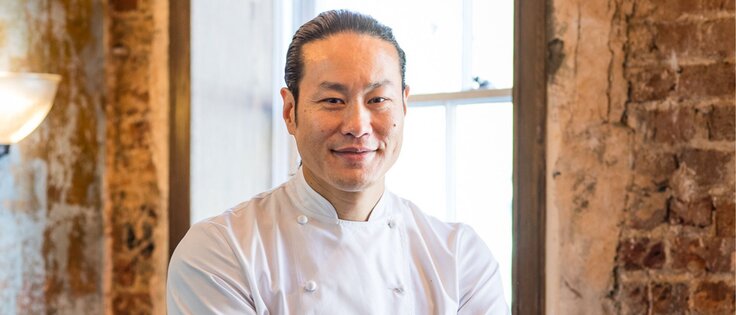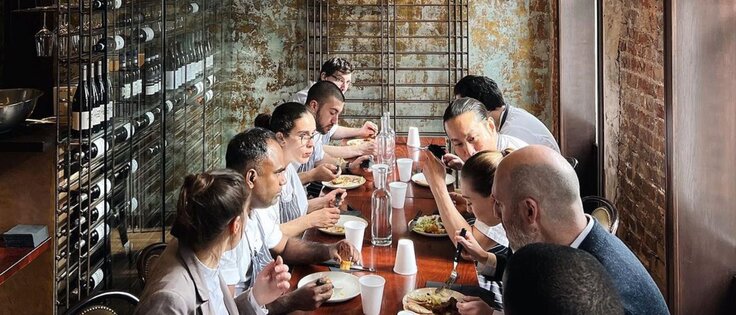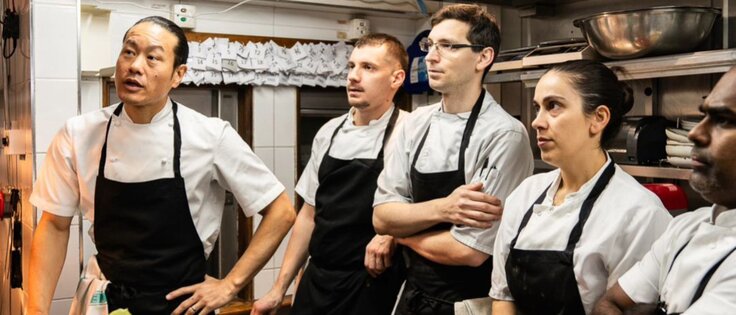
Article
8 min read
How Jun Tanaka built an unstoppable culture at The Ninth
Kitty Finstad
May 8, 2024
What's on the menu?
Meet the team
- Who: Jun Tanaka
- Role: Chef patron
- Business: The Ninth
- Where: Fitzrovia, London
That serves up
- Over 30 years of experience
- A one-of-a-kind culture
- The perfect work/life balance
- Training that helps teams lead
When a restaurant resumes normal service after a pandemic – and then a fire that closed its doors for eight months – you know its backbone is strong. For chef patron Jun Tanaka, the culture that drives The Ninth is as vital an ingredient for success as anything deftly treated by his kitchen brigade. While upholding a Michelin star every year since 2017, Tanaka takes a thoughtful, holistic approach to running The Ninth. From the restaurant’s elegant yet relaxed first-floor dining room, Jun spoke to Kitty Finstad about culture-centric foundations, small changes with big impact, and leading by example to create a happier, healthier hospitality era.
Learning from the industry’s mistakes
Before opening The Ninth, you passed through eight other restaurants over three decades. I imagine you’ve seen the best and the worst of kitchen culture.
I started cooking 33 years ago, a totally different era for restaurants. The culinary training and experience I gained was invaluable – I wouldn’t change it. But did I enjoy going to work every single day? No – there were times I hated it because of the culture of fear. We were so intimidated by the chef that all we could focus on was self-preservation. We were afraid of making mistakes, so we would try to cover them up. The result was a fearful and aggressive kitchen with no teamwork. Working in that kind of environment? I loved the cooking but didn’t enjoy the culture.
Lessons in how not to retain staff! When it came to opening your own business, there must have been some intentional discussions about how culture would figure in the business plan.
Yes, there were. Before we opened the restaurant, I remember sitting down with the senior team and discussing the menu, the service… and we all agreed that the team would be our priority. We wanted to create a working environment where every member of the team feels valued, fulfilled and inspired. It’s for that reason that over the past nine years we’ve focused on developing our culture.

Changing hospitality’s culture
How do you strategise something as intangible as culture?
Culture is a set of values, beliefs and behaviours, and for me it’s the most important aspect of working at The Ninth. It’s the strong foundation that everything else is built upon. It’s also something that you have to nurture and mould – you can’t just let it happen; if you do, the the result will not be good. It’s through our words and actions that we create the culture we want, and this starts with leading by example. It’s the most powerful and effective way to influence a team. We are always learning, and over the years we’ve become better at shaping our culture. And we’re constantly having discussions with the senior team about how we can improve even more.
This is where clear and compassionate leadership comes into play?
Absolutely. Culture needs direction and we have a very clear vision of what that looks like. Which is why, when we had to close for eight months after we had a fire in July 2022, we had a strong foundation to get us through that challenging time. One of the silver linings of the fire is that it gave me the time to really think about what we do that contributes to creating our culture. I used that time to write our culture document, which I shared with the team and also published on our website.
Beyond articulating your values and giving guidance on ways of working and interacting, a culture document can also be a powerful recruitment and retention tool.
Definitely. It’s a guide for all of us, and we use it to say “this is who we are” – it’s there to help new team members understand our values, even before they step through the door. It’s an advantage for someone looking for their next role, because most of the time you don’t know what the culture of a place is actually like until you start working there. Having it written down helps us to find people who share our values.
And when people know the framework and the expectations, they’re more likely to go with you on that journey.
Yes, and we believe this begins with leading by example. The senior team and I have to personify the culture. When we do that, everyone else knows what’s expected of them, because it’s human nature to respond to leadership and follow examples. As the owner of the restaurant, my number-one responsibility is good leadership and nurturing a positive workplace culture.

Training teams and feeding back
Leadership was the most important tool in your kit while the restaurant was closed after the fire. You kept everyone on – and they stayed with you. How did that period unfold?
We felt that it was essential to keep the team engaged and developing, so we organised two training sessions every week – including charcuterie training, visiting vineyards, foraging, even some yoga. Things that we always wanted to do but never had the time for. Spending that time together as a team had a positive impact on all of us. It brought everyone closer, and I believe this period helped us to further improve how we worked together.
And what does training look like since ‘normal service’ resumed?
Every four months we sit down with each team member and look at their personal development plan together. We share feedback on the previous four months – what’s gone well and where they need to improve. And then we look forward to the next four months: what would they like to learn and achieve next? Having these regular conversations means understanding people’s goals. And if we can facilitate those goals, that can lead to people feeling more fulfilled and engaged at work.
Hospitality businesses are leaning into more ‘formal’ or ‘corporate’ methodologies like staff surveys and 360-degree reviews.
During their personal development plan chat, each senior team member asks three questions: “What one thing should I stop doing to make your work better? What should I start doing? And what should I continue doing?” It’s a great way to give feedback to managers, and we give people time to think about it so they don’t feel pressured. The more senior you get the less feedback you get, and it can sometimes be difficult to hear. But we encourage it because sometimes people at the top lack self-awareness when the feedback is only shared top-down.
Striking the right work/life balance
What work/life balance feedback do you get? People have lives beyond work – I imagine it’s difficult for you as a committed business owner to lead by example in that area?
Work/life balance is one of the hardest things in our industry. Especially in a Michelin-star restaurant, it’s probably one of the most difficult things to achieve. But we’ve done a few things operationally that help. For example, we’ve brought last orders forward to 9pm Monday to Wednesday, and to 9.30pm Thursday to Saturday. It means people get home that bit earlier.
Small tweaks can be so meaningful. Any other operational changes that have shifted the balance in the right direction?
Yes! One of the best things we’ve done is to employ a night cleaner, who does all the kitchen and restaurant. At the end of a dinner service that saves the chefs around 45 minutes to an hour of cleaning time, meaning the chefs finish earlier and everyone else gets out earlier too. There’s a cost associated with employing the cleaner, but it’s worth it when we look at how it affects the team.
Freeing up people’s time, even little by little, is bound to have a cumulative benefit.
Definitely. And we’ve seen that in the chefs’ weekly shifts, which we’ve changed to three-and-a-half days on, three-and-a-half days off. We looked at the late shift, and found we could start it half an hour later at 3.30pm instead of 3pm. And going into summer, we’re looking at starting one of the double shifts at 10am instead of 8am. It’s one morning that they can sleep in or go to the gym before starting their shift. We also tell the senior team to rota themselves onto seven instead of eight shifts when we’re fully staffed.
On days off, I put the ‘no’ in notifications. But when people do want to be in touch, do want to talk, how do you let them know you’re looking out for them?
There’s less stigma around mental-health issues now and I think people know it’s okay to talk about it. At The Ninth, our medical form for new starters allows people to let us know about issues like anxiety or depression. When we have that information, we can talk about it with them, confidentially and respectfully. Ask them how we can support them and get a better understanding of their condition.
I’m proud that we’ve created an environment where people feel safe and can share their concerns. We don’t do any specific mental-health support, but I think we should and it’s on my list to look into. But just having increased awareness is a big, positive change for the industry.

Retaining teams by training leaders
How can the hospitality industry attract more people and encourage them to stay and build a really good, fun, viable career?
There are several things we can do. The first is to look at cross-industry data about why people leave. One survey I read said that over 50% of people leave because of bad leadership. In hospitality, we spend so much time, money and energy recruiting. We try to retain people by giving them promotions and paying them more, but we don’t look at leadership. If we can spend time and attention on training people to be better leaders, I believe this will make a huge difference to retention. People are usually promoted just for their skills and knowledge. For example, you’re a chef de partie who gets promoted to sous chef because you know all the sections in the kitchen and you’re quick at MEP [mise-en-place]. Great. Doesn’t mean you can lead a team, because no one has shown you how to.
The perfect example of leading by example within a supportive culture…
Exactly. We need to teach people how to lead. The best way is by showing them how. By being an example. This is how we talk to people in a respectful manner. This is how we show up to work with a positive attitude. This is how we take responsibility for our words, actions and behaviours. If we do this consistently, then we train the new generation to be better leaders. And those better leaders are a reason to stay.
Want to start a conversation with your own team?
If you liked that, you'll love this

How Dishoom dishes up the industry standard for staff retention
When it comes to retaining top talent, Dishoom are experts. But what are they doing right? To find out, Planday sat down with Dishoom's Head of People, Kate Moscardini.

The Shift Towards Retention
The Shift Towards Retention is our new deep dive into the state of the hospitality industry's staffing situation. Download it for free, here.
